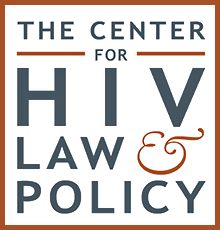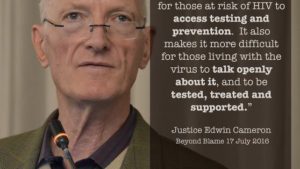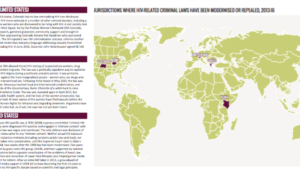Overview
There are no HIV-specific offences in Colorado; however sentence enhancements exist for certain offences committed by people living with HIV. These were reformed in 2016, repealing one form of enhancements and narrowing another. General criminal laws have also been used to prosecute perceived HIV ‘exposure’ and alleged transmission.
Prior to 2016, people aware that they were living with HIV were subject to significantly higher prison sentences for sexual offences involving penetration (defined broadly to also include oral sex) regardless of whether transmission occurred and whether there was intent. This effectively criminalised ‘exposure’ in the context of non-consensual sex. The enhanced penalty was at least three times the maximum of the base offence, resulting in significantly higher penalties for people living with HIV. Additionally, the offence of ‘prostitution’, ordinarily a misdemeanour offence, was increased to felony level where committed by a person aware they were living with HIV. All people convicted of sex work offences were required to be tested for HIV, and if found to be HIV-positive, this could be used to prosecute them for the enhanced offence.
Despite these laws being in place for many years there were few known prosecutions. In 2016 research identified only a few cases in which people had been charged under the ‘sexual assault with HIV’ provision, and all ended in plea bargains, meaning that no court cases had ever taken place. For the ‘sex work with HIV’ offence, there were only six known cases, several of which were against one person.
Despite the low number of known cases, a group of HIV advocates began to organise to modernise the law. The group, led by the Positive Women’s Network-USA Colorado, would later become known as the ‘Colorado Mod Squad’, and over the course of more than four years, built grassroots support for reform by working with local networks of people living with HIV, other allies and advocates, medical experts, and officials in the Department of Health. Having built this network, the Mod Squad approached state Senator Pat Steadman to sponsor a bill that would ‘modernise’ HIV laws in Colorado. In March 2016, SB 146 was brought before the legislature and passed both houses in May. It was signed into law in June 2016. See HJN’s 15 minute video, ‘The Colorado Story’, for a more detailed account of this process.
SB 146 fully repealed the sex work offences requiring HIV testing for all arrests as well as enhanced sentences for those living with HIV. It also amended the ‘sexual assault with HIV’ provision to require transmission for the offence to be satisfied. The sentence required was also adjusted, and now judges can impose a sentence ranging anywhere from the maximum of the base offence to life imprisonment. Despite the positive step of requiring transmission to occur, this reform still leaves open the possibility of severe prison sentences for people living with HIV convicted of sexual offences. Furthermore, there is still no requirement of intent, so someone could be convicted even if they take precautions that ultimately fail to prevent transmission.
Furthermore, prosecution under general criminal laws is also possible. There have been convictions for ‘reckless endangerment’ for people living with HIV and proof of intent or transmission is not required. The offence of ‘felony menacing’ has also been used, which requires a person to place or attempt to place another in fear of ‘imminent serious bodily injury’ by threat or action, and where this involves a ‘deadly weapon’, this is a class 5 felony. HIV status has been considered a deadly weapon for these purposes, given the perceived risk of ‘serious injury’ it entails (see CHLP report for case details). Transmission is again not required. Assault has also been used to prosecute cases of spitting, despite the lack of transmission risk.
In 2009, a case made headlines in which a man living with HIV was convicted of child abuse resulting in serious injury after having sex with his pregnant fiancée. Both the woman and her unborn child acquired HIV, but no charges were brought in relation to the woman. This was said to be the first ever ‘father-to-child transmission’ criminal case.
Public health officials can also impose restrictions and obligations on people living with HIV. This can include compulsory testing, examinations, and orders to cease certain conduct. These orders must be issued as a last resort, but failure to comply can result in temporary commitment upon a court order.
For a detailed analysis of HIV criminalisation in Colorado, as well as all other US states, see the Center for HIV Law and Policy report, HIV Criminalisation in the United States: a Sourcebook on State and Federal HIV Criminal Law and Practice.
Laws
Colorado Statutes § 18-3-415.5
Testing persons charged with certain sexual offenses for serious sexually transmitted infections – mandatory sentencing
(…)
2. The court shall order any adult or juvenile who is bound over for trial subsequent to a preliminary hearing or after having waived the right to a preliminary hearing on a charge of committing a sexual offense to submit to a diagnostic test for the human immunodeficiency virus (HIV) and HIV infection, said diagnostic test to be ordered in conjunction with the diagnostic test ordered pursuant to section 18-3-415. The results of the diagnostic test must be reported to the district attorney. The district attorney shall keep the results of such diagnostic test strictly confidential, except for purposes of pleading and proving the mandatory sentencing provisions specified in subsection (5) of this section.
3. a. If the person tested pursuant to subsection (2) of this section tests positive for the human immunodeficiency virus (HIV) and HIV infection, the district attorney may contact the state department of public health and environment or any county, district, or municipal public health agency to determine whether the person had been notified prior to the date of the offense for which the person has been bound over for trial that he or she tested positive for the human immunodeficiency virus (HIV) and HIV infection.
b. If the district attorney determines that the person tested pursuant to subsection (2) of this section had notice of his or her HIV infection prior to the date the offense was committed, the district attorney may file an indictment or information alleging such knowledge and seeking the mandatory sentencing provisions authorized in subsection (5) of this section. Any such allegation must be kept confidential from the jury and under seal of court.
Colorado Statutes § 18-1.3-1004
Indeterminate Sentence
(…)
(d) If the sex offender committed a sex offense that constitutes a sexual offense, as defined in section 18-3-415.5, and the sex offender, prior to committing the offense, had notice that he or she had tested positive for the human immunodeficiency virus (HIV) and HIV infection, and the infectious agent of the HIV infection was in fact transmitted, the district court shall sentence the sex offender to the custody of the department for an indeterminate term of at least the upper limit of the presumptive range for the level of offense committed and a maximum of the sex offender’s natural life.
Colorado Statutes
18-3-203 Assault in the second degree
1. A person commits the crime of assault in the second degree if:
b. With intent to cause bodily injury to another person, he or she causes such injury to any person by means of a deadly weapon; or
(…)
d. He recklessly causes serious bodily injury to another person by means of a deadly weapon; (…)
18-3-206 Menacing
A person commits the crime of menacing if, by any threat or physical action, he or she knowingly places or attempts to place another person in fear of imminent serious bodily injury. Menacing is a class 1 misdemeanor, but it is a class 5 felony if committed by the use of a firearm, knife, or bludgeon or a simulated firearm, knife, or bludgeon.
18-3-208 Reckless endangerment
A person who recklessly engages in conduct that creates a substantial risk of serious bodily injury to another person commits reckless endangerment, which is a class 2 misdemeanor.
Further resources
Not all laws used to prosecute people living with HIV in this state are included on this page. For a comprehensive overview and analysis of HIV-related criminal and similar laws and policies, visit The Center for HIV Law and Policy
How a group of dedicated advocates in Colorado ‘modernised’ their HIV-related laws to improve the legal environment for people living with HIV. Featuring Barb Cardell and Kari Hartel of the Colorado Mod Squad and Colorado State Senator, Pat Steadman. Interviews by Mark S King. Written and introduced by Edwin J Bernard. Directed and produced by Nicholas Feustel for the HIV Justice Network




